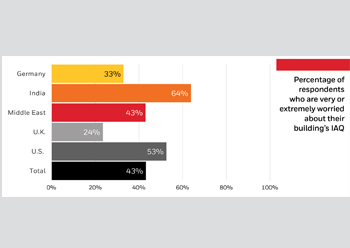Region puts stress on IAQ in workplace
01 July 2023
There is high awareness in the Middle East about the importance of indoor air quality (IAQ) to health and well-being, and a vast majority of workers in the region say it contributes positively to their productivity, according to a recent survey commissioned by Honeywell Building Technologies (HBT).
As per the findings of Honeywell’s third annual Healthy Buildings Survey of workers across the Middle East (Egypt, Saudi Arabia and the UAE), an overwhelming majority of respondents (90 per cent) agreed that the quality of the air they breathe has a direct impact on their health and well-being.
Notably, 80 per cent of those surveyed in the Middle East say good IAQ contributes positively to their productivity – more than the global response rate of 68 per cent – and more than four in five office workers in the Middle East (81 per cent) said it is very or extremely important that their employer or building manager take steps to reduce their workplace’s carbon footprint (compared to 73 per cent globally).
The survey was conducted among 2,500 office workers in buildings with 500-plus workers in Germany, India, the Middle East, the UK and the US. For the first time this year, the survey posed questions to gauge office workers’ beliefs and attitudes about their building’s environmental impact.
Given a choice of having their employer prioritise either improving IAQ or reducing their building’s carbon footprint, nearly half (44 per cent) of respondents say their organisation should be able to accomplish both objectives. These findings suggest that employees’ concerns for the environment is increasing along with their belief that office IAQ affects their well-being and productivity.
 |
|
|
The workers surveyed in the Middle East also voiced more trust than respondents in the other regions that their employer or facility manager has taken the necessary steps to provide safe IAQ, with nearly nine in 10 (88 per cent) agreeing. The percentage of Middle East respondents who ‘strongly agree’ with this sentiment (58 per cent) jumped by a surprising 17 per cent from last year’s results. Ultimately, Middle East employees put the onus on employers and building managers to maintain IAQ.
Middle East respondents aligned with the other four regions in their willingness to give up job perks or benefits if it meant the funds would be reinvested to reduce the environmental impact of their building. A surprising 35 per cent of respondents would sacrifice part of their salary or bonus, while nearly all of those surveyed (95 per cent) would give up at least one job perk or benefit, including:
• Food perks like coffee, tea or snacks (45 per cent);
• Building amenities such as a fitness centre or lounge (41 per cent);
• State-of-the-art technology for their day-to-day work (40 per cent).
Among the five surveyed regions, respondents in the Middle East and India tied for the lead in wanting to be kept informed about their office building’s current IAQ, with nearly nine in 10 (89 per cent) wanting frequent or at least occasional updates. Those surveyed in the Middle East also led the field (63 per cent) in claiming they would speak with their leadership if the latter did not put measures in place to maintain a healthy indoor environment.
“These findings suggest that surveyed office workers in the Middle East view safe air quality as a top priority and trust that their employer or building manager has taken the steps to provide it in the workplace,” says Phil Daniell, Vice-President and General Manager, Honeywell Building Technologies, Middle East, Turkey and Africa. “The awareness of surveyed workers in the Middle East reflects the investments in the region to create healthier and more sustainable buildings to help meet respective development goals. This can continue to help guide employers and building managers stay ahead of the curve when it comes to improving occupant experience and a building’s carbon footprint.”
Surveyed workers’ concerns about the environmental impact of their workplace may be buoyed by the emphasis organisations are placing on sustainability, as detailed in the 1Q 2023 Honeywell Environmental Sustainability Index, a quarterly survey of business leaders directly involved in their organisation’s environmental sustainability initiatives. Some 71 per cent of organisations surveyed in the second release of Honeywell Environmental Sustainability Index ranked sustainability as one of their top five priorities (highest percentage) and 63 per cent of surveyed organisations said energy evolution and efficiency are a top priority. The index shows organisations are increasingly taking a balanced approach to environmental solutions, embracing more technological solutions alongside process changes.
Honeywell says its ready-now Healthy Buildings solutions can help improve occupant well-being, meet energy efficiency goals and, importantly, change the way occupants experience a building.
Honeywell Building Technologies is a leading building controls company with operations in more than 75 countries supported by a global channel partner network. Commercial building owners and operators use its hardware, software and analytics to help create safe, efficient and productive facilities. Its solutions and services are used in more than 10 million buildings worldwide.
Percentage of surveyed workers



